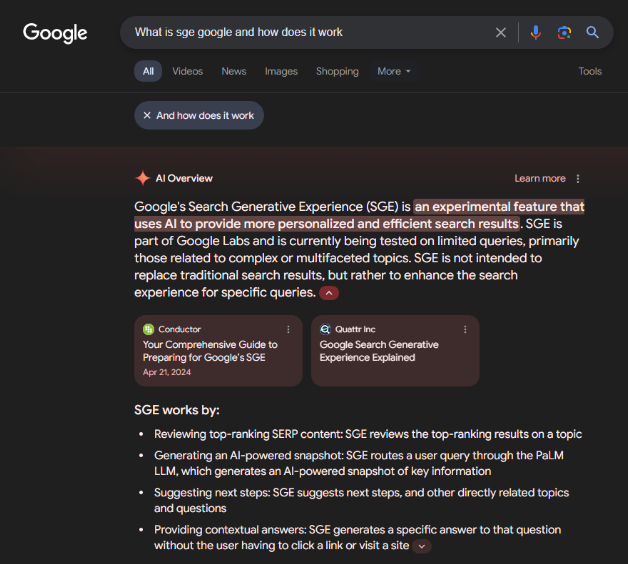What is Search Engine Generative Experience (SGE)?
In 2023, Google announced the Search Generative Experience (SGE), which was officially rolled out as AI Overviews on May 14, 2024.
The Search Generative Experience or “SGE” for short, is a new feature in Google Search that integrates generative AI to enhance how users find and interact with information. The goal is to make the user research process shorter by doing the research for them. It’s going to change the traditional search experience by providing more complex and descriptive query handling, quicker topic overviews, and seamless follow-ups.
For example:
If someone searches up “What is sge google and how does it work”, the AI will do the hard work for the user.

This allows users to engage with search results more conversationally and intuitively.
How was SGE created?
SGE is rooted in Google’s long-term commitment to leveraging AI in search. Over the years, Google has incorporated various AI advancements, such as BERT in 2019 and the Multitask Unified Model (MUM), which significantly improved search quality by understanding the context of words and facilitating more complex searches.
SGE represents a natural progression of these advancements, bringing cutting-edge generative AI capabilities to the forefront of Google Search. It was introduced as part of Google’s Search Labs program, an experimental platform launched to explore new ways of enhancing search functionality.
How Does SGE Work?
SGE uses advanced machine learning models like Transformer-based architectures (similar to BERT and MUM) to analyze and generate content. These models can process and understand vast amounts of data, recognizing patterns and context to deliver precise and comprehensive summaries. SGE employs Natural Language Processing (NLP) techniques to interpret user intent and generate responses that align closely with the original search query.
How does it operate?
SGE, or Search Generative Experience, operates in several key ways:
- First, it routes a user’s query through the PaLM LLM, a sophisticated language model, which then generates an AI-powered snapshot of essential information related to the query.
- Next, SGE suggests follow-up actions, such as exploring related topics or refining the original query based on the user’s interactions.
- It also presents AI-powered overviews of topics, highlighting key factors and providing valuable insights.
- Moreover, SGE can leverage user profiles to tailor responses based on what it already knows about the user and their understanding of the topic.
How do I turn on SGE?
- Open the Google app on your Android device.
- Sign in to your Google Account.
- Tap the Labs icon in the top left corner.
- Under the SGE while browsing card, switch the experiment to “Turn on.”
- Initially, SGE is available in English and for users located in the U.S.
How do I turn it off?
Google’s Search Generative Experience (SGE), now known as AI Overview, has evolved into a permanent part of Google Search, making it impossible to disable or remove entirely. However, if you wish to turn off the generative AI search results, you can follow these steps:
- Open Google Search.
- Click the Search Labs button located in the top-right corner.
- Turn off the SGE toggle switch.
Alternatively, you can utilize the Turn Off AI Overview extension, which allows you to hide the AI overview with a simple toggle button. To use this extension, click the extension icon in your browser toolbar and toggle the button to turn the feature on or off.
Another option is to filter the result page by selecting the “Web” filter. This may help reduce the prominence of AI-generated results.
Using an incognito window for searching can circumvent AI features, as you won’t be signed into your Google account by default. However, this may limit certain functionalities like search syncing and other Google services.
For a more comprehensive solution, consider using the Bye Bye, Google AI extension, which is designed to remove unwanted AI features entirely.
Benefits of SGE for SEO
In SEO circles, Google’s Search Generative Experience (SGE) isn’t a sign of trouble. In fact, according to Neil Patel, 55% of marketers see it as a positive change.
SGE has several benefits for SEO, particularly in terms of website visibility and user engagement. One of its key advantages is the boost in visibility it offers. Websites that provide high-quality, relevant content have a better chance of being featured in the AI-generated summaries created by SGE. This can significantly increase a site’s visibility on search engine results pages (SERPs).
Improved user engagement is another major benefit. SGE’s detailed summaries can attract more engaged traffic to websites. Users who find comprehensive answers in the summaries are more likely to click through to the source for further information, leading to higher quality visits.
Being featured in SGE summaries can also enhance a website’s reputation and perceived authority, boosting brand credibility.
It won’t be the end of SEO. It comes with new opportunities. What are the opportunities created with this new feature?
Firstly, SGE presents a host of fresh opportunities. By focusing on producing high-quality content that directly addresses user queries, websites can increase their chances of being featured in SGE results. This means creating detailed, accurate, and relevant content is more crucial than ever.
Structured data implementation plays a significant role.. Utilizing structured data, websites can help search engines better comprehend their content, making it more likely to be included in SGE summaries. This, in turn, enhances the visibility and accessibility of the content to users.
SGE tends to favor in-depth content that thoroughly covers a topic. By providing comprehensive coverage of a subject, websites can improve their chances of being selected for inclusion in SGE summaries. Including contextual information and exploring related topics can enrich the content, making it more appealing to both users and search engines alike.
What does this mean for SEO Specialists? Will Google SGE Feature replace SEOs?
No it won’t. At least, not for a long time.
The reason lies in the inherent limitations of generative AI technology. Much like AI chatbots, the output of generative AI is far from perfect and requires a thorough and nuanced approach to get the most out of it. SGE, similar to ChatGPT and other tools, is prone to hallucinations, which can lead it to provide incorrect or misinterpreted information. Additionally, it can exhibit internal biases that skew its output.
While SGE introduces a more efficient way of finding answers to questions, the inclusion of AI necessitates a critical review of each output for clarity, consistency, and accuracy. This is where the expertise of SEOs becomes indispensable. SEOs not only understand how to optimize content for search engines but also know how to ensure the accuracy and relevance of the information being presented. They play a crucial role in mitigating the risks associated with AI-generated content by validating the data and making necessary adjustments.
What SEO Specialists can do that AI can’t.
Optimizing for Google’s Search Generative Experience (SGE) demands a human touch and deep SEO expertise. One crucial element is implementing schema markup, which helps Google understand a site’s context and content. This structured data significantly boosts the chances of appearing in SGE summaries. Yet, configuring schema correctly requires a profound understanding of SEO principles and the skill to apply them effectively.
Another key aspect is ensuring content embodies Expertise, Authoritativeness, and Trustworthiness (E-A-T). Content that aligns with these principles stands a better chance with SGE. This implies that SEOs must continuously evaluate and enhance content quality to sustain its relevance and authority.
SEOs also excel in optimizing for long-tail keywords and natural language queries. While SGE is adept at understanding conversational queries, it takes a strategic approach to pinpoint and target the right keywords. SEOs analyze search trends and user behavior to optimize content, ensuring it addresses user needs.
Keeping content updated is crucial for maintaining or increasing its ranking in SGE-generated summaries. Fresh content is favored by SGE, but maintaining currency demands ongoing dedication and attention to detail, something AI alone cannot accomplish without human intervention.
SEOs play a crucial role in enhancing the technical aspects of a website, including optimizing site structure, improving site speed, and deploying advanced algorithms and tools through AI and machine learning. These enhancements not only enrich user experience but also elevate search engine visibility and performance.
Securing high-quality backlinks from reputable websites necessitates strategic outreach and relationship-building, tasks that require a human touch.
What can you do today to adapt to this new feature?
To adapt to Google’s Search Generative Experience (SGE), it’s essential to adjust your keyword research and content creation strategies. SGE focuses on understanding and responding to conversational queries, so targeting these types of queries is crucial. This means focusing on long-tail keywords and natural language phrases that users might use in spoken or written questions.
It’s important to prioritize creating informational content that provides clear, comprehensive answers to common questions related to your niche. This type of content is more likely to be selected by SGE for its summaries. Additionally, regularly updating your content to ensure it remains current and relevant is key, as fresh content is favored by SGE.
Another important aspect to consider is the user experience (UX) of your website. Enhancing the overall design, usability, and accessibility of your site can create a more satisfying and engaging experience for visitors, which can positively impact your SEO efforts.
Allocating additional resources to improve the technical aspects of your SEO is also crucial. This includes optimizing your website’s structure, improving site speed, and implementing schema markup to enhance search engine visibility and performance.
It’s beneficial to explore AI and machine learning technologies to improve your SEO strategies. Researching and implementing advanced algorithms and tools can help you stay ahead of the curve in an increasingly competitive landscape.
Lastly, strengthening your backlink profile should be part of your strategy for SGE. Acquiring high-quality backlinks from reputable websites can improve your search engine rankings and drive more organic traffic to your site.
If you’d like to learn more about preparing your website for SGE and improving organic rankings, contact IMPACT Digital Marketing.



